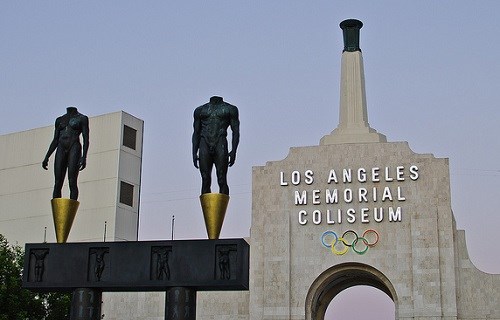Another study projects billion dollar output from hosting the Olympics
A new study looking into the economic impact of hosting the 2024 Olympics in the city of Los Angeles finds that it could entail significant increases of up to $18.3 billion dollars nationwide.
The study is conducted by the Beacon Economics and the Riverside School of Business Centre for Economic Forecasting and Development at the University of Califormia (UCR).
“There is little doubt that hosting the Olympics is an enormous boost for a local economy—both in the short term as driven by activity surrounding the events themselves, and in the long term given how these events raise the global profile of the region,” said Christopher Thornberg, founding partner of Beacon Economics and director of the UC Riverside School of Business Center for Economic Forecasting and Development, in a press release.
Apart from the increased gross economic output, the study says, Los Angeles would also benefit from additional tax revenues, up to 79,307 new full time jobs, up to $7.07 billion in direct additional spending and increased worker earnings worth up to $5.11 billion.
“The worry is always that these benefits come at too high a cost, but because Los Angeles already has many of the assets needed for a successful Olympic experience, the upside is far greater than it would be for many other cities who would be hosting for the first time,” Thornberg said
However, studies into the Games legacy regularly question the actual economic impact and long-term effects of mega-events and raise critique of the often overly optimistic projections. One reason is that projections rarely include cost overruns.
According to a study released last year from the Oxford University and SAID Business School, almost 50 percent of the Olympic Games, including summer as well as winter Games, have cost overruns above 100 percent, making the Olympics the riskiest type of mega-event.
Another study, conducted by the California Legislative Analyst Office and released in November, also viewed the Los Angeles bid as “low-risk and fiscally responsible” planned and estimated a ‘neutral’ long-term economic impact, writes Inside the Games.
Los Angeles is bidding for the right to host the 2024 Olympics against Paris, France and Budapest, Hungary.
The bid committee of Paris 2024 released a study conducted by the Centre de Droit et d’Economie du Sport looking into the economic impact expected form hosting the Games in Paris and found it could generate €10.7 billion ($11.3 billion) in economic benefits and create more than 250,000 jobs in the Paris region, Île-de-France.
In an April 2016 interview, chairman of the Budapest bid, Balázs Fürjes,said that estimates projected “nearly $10.3 billion (HUF 2.983 billion) in surplus income for the entire economy across the state, corporate, and household sectors”.
The IOC will decide where the 2024 Games will be hosted during the IOC session in Lima on 13 September.
More information
Read the UCR report in full:
Read a UCR press release about the report:
Read the study by the California Legislative Analyst Office:
Press release about the June 2016 report into Paris 2024 impact:
Read the report into the 2025 Paris Olympics (In French):






